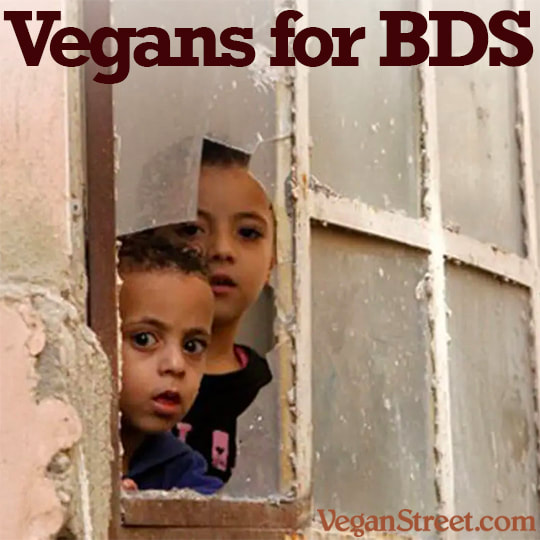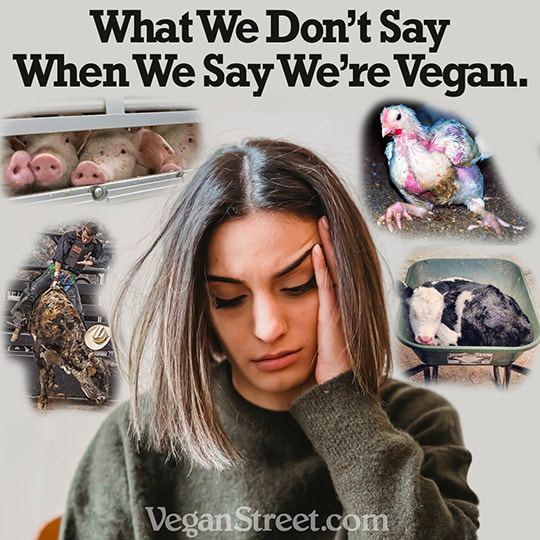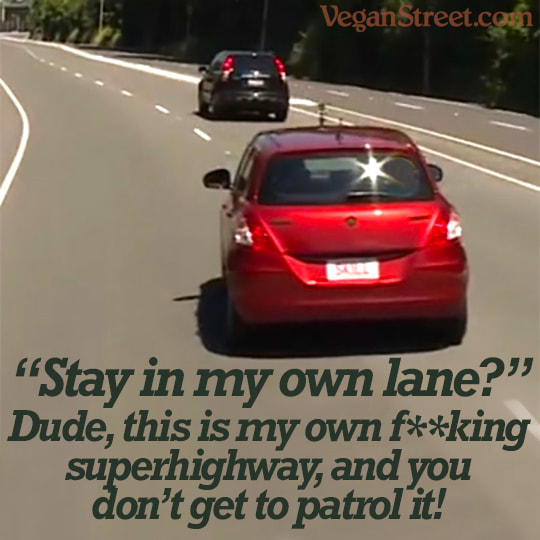|
Vegans for BDS
Yesterday, I heard a story on NPR about how one extended family that lived in two neighboring apartment buildings in Gaza was decimated - literally, 22 members of the family, including children - were killed when the Israeli military bombed their homes without evacuating the people who lived in the buildings, supposedly targeting underground tunnels used by Hamas. This extended family of grandparents, parents, aunts and uncles, cousins, children - a family of civilians with close business ties to Israel and who were unaffiliated with Hamas - is among the more than 240 known casualties in Gaza. As I write this, 12 have been killed in Israel due to this most recent conflict. John and I started VeganStreet.com in 1998 because we were moved to speak up against injustice, oppression and cruelty, and speak up for justice, compassion and equality. As Vegan Street has transformed over the years, our vision and voice has expanded to include speaking up against persecution when we see it as our evolving vegan practice is one of expanding, inclusive advocacy. As naive as it might sound, we believe we cannot get to the root of what allows cruelty to animals to continue unchecked unless we can be clear-eyed and fearlessly honest about that seed of brutality - that poisonous seed that allows us to turn our fellow beings into commodities or pariahs based on arbitrary circumstances of birth - whenever we see it. This is why Vegan Street stands in solidarity with Vegans for BDS, which is part of the Boycott, Divestment and Sanctions movement, a Palestinian-led, non-violent movement for equal rights for Palestinians and effort to make Israel comply with international law. Just as there was an active movement protesting South Africa’s apartheid in the 1980s, there is a growing worldwide campaign against the deep systematic discrimination and displacement of Palestinians on smaller and smaller parcels of land. The South African anti-apartheid movement was ultimately successful with a multi-pronged effort that included vigorous boycott, divestment and sanction strategies, and the hope is to use similar pressure points to help indigenous Palestinians in their fight for basic human rights, fairness and sovereignty. This is also why we support the Vegans for BDS in their campaign to pressure plant-based consumer products seller PlantX to end their planned expansion into Tel Aviv, which has been funded to the tune of $11.5 million by Psagot, an investment company that is financially linked to Israel’s military occupation. The cruelty of decades of occupation and control of Palestinian land cannot be wiped away with investment in a plant-based company, nor is such a relationship ever truly apolitical or neutral. In fact, as conscientious consumers and advocates, we must do everything we can to remind plant-based businesses of our ethics and values by holding them accountable to the violence they are aiding and abetting through their associations and investments. As one half of Vegan Street, I wrote this as someone who feels deeply connected to my Jewish heritage; my grandparents were fortunate enough to evade genocide in Europe and my grandfather’s quiet but ever-present grief as a ghetto survivor is forever etched on my psyche. As a Jew, I was taught to speak up for the oppressed, to never be on the side of the oppressor, and to think deeply about the kind of person I want to be and the legacy I want to leave behind. My Jewish background instilled the values in me that led me to go vegan 26 years ago, and today, these same values lead me to stand in solidarity with Palestinians and their fight for human rights. Please join me in asking PlantX to show true compassion and stand against injustice by not expanding into Israel. Thank you, Marla Rose VeganStreet.com
2 Comments
What We Don't Say When We Say We're Vegan When I first went vegan, it was the mid-1990s and I worked at an animal shelter in humane education. Although the concept of veganism was pretty much at the infancy of a growing public awareness - a little further along in some areas, less so in others - even then, I still had baggage as a rare in-the-flesh representative at my place of work. I saw the eyerolls and irritation when I’d request vegan meals at catered holiday parties. I noticed the smirks at my little attempts at advocacy and the snubs at group outings. When pushback happened, it was very noticeable because for the most part, we were a tight-knit group and got along great, except for those times that the simple fact of my veganism became its own wedge. I remember my last day there, I went out to lunch with Jennifer, a friend in my previous department, and she said, “You are one of those good vegans. You lead by example. Most vegans are way too pushy.” Although it was meant to be a compliment, mainly what I felt as we walked down the street was baffled. How many vegans did Jennifer really know? How many did she interact with? This was in the days before social media, certainly before the internet as we know it today. I actively worked to find a vegan community and I only knew a handful of individuals myself, the same people who were at every rodeo protest and Meat Out leafleting event, so how could Jennifer - avidly a meat-eater, we had a relationship of playfully harassing each other - know so many vegans to have developed this entrenched worldview about us? It was also so early on that the trope of the pushy vegan wasn’t really a widespread thing because we barely registered as a blip worth being bothered about. Somehow, though, it was clear that Jennifer’s attitude was not isolated to just her but was aligned with the prevailing position of my coworkers. That was odd to me and it was then that I learned that simply by existing as vegans, even if we toe the line and don’t rock the boat (admittedly, not my strengths), our identity as vegans is already a strike against us. . . . Moments after wondering how Jennifer could have this vast experience with vegans, enough to form her dim view of us, I thought this: I was knee-deep in researching animal agribusiness, which was why I went vegan in the first place. Like many people in the process of going vegan, I read every article and book that I could get my hands on and I watched every horrific documentary. It was like a light in a dark room progressively being turned on to the point where the things you used to not notice became starkly illuminated. My little moments of outreach, were they really so invasive given what vegans know about the gravity and scale of unnecessary suffering and violence inflicted on innocent beings? Being seated at a leather booth at the restaurant with Jennifer, the smell of charred flesh and fried cheese in the air, bones soon to be on her plate: Did she have any idea how much tunnel vision the average vegan has to develop just to get from Point A to Point B without breaking down? As vegans, we have researched and immersed ourselves in understanding how animals are systemically brutalized and we see glaring evidence of it everywhere while most people don’t notice and we’re expected to keep it to ourselves lest we be perceived as pushy buzzkills. If people realized how much even the most outspoken vegans have to numb themselves to or steel themselves against just in order to peacefully coexist - things the average person doesn’t notice, from the innocuous-seeming cheese danishes on a platter in the breakroom that remind us of the horrors of the dairy and egg industries to coworkers who are selling tickets to BBQ fundraisers - well, I think they’d be pretty impressed with how stoic we actually are in the face of that and how much we keep things to ourselves. . . . Vegans are not the victims here. Make no mistake, that is not my point. The animals are the ones who are victimized. The broad-stroke characterization of vegans are a bunch of aggressive killjoys, though, is as unfair today as it was in 1995. If I were as sensitive and fragile as people seem to like to think of me, though, I’d never be able to leave my house, knowing what I know, and if I were a fraction as pushy as meat-eaters characterize vegans, well, I would never shut up. Ever, ever, ever. Yet I live a pretty normal life. Pandemics aside, I haven’t made a decision to barricade myself in my home just yet, though the thought has certainly been tempting. The fact is, to be an effective voice for the animals, you have to be informed, which means pain, you have to engage, which means vulnerability, and you also have to detach for reasons of self-preservation. It often feels like both a clumsy dance and a tightrope walk. I have come to look at what we need to do the Hokey Pokey: You put part of yourself in, you take yourself out, you put yourself back in and on and on. You even shake yourself about. That is how you have to engage to be a long-term animal advocate, even when your whole heart is shattered and your nerves are shot. It gets easier as you go but there will always be imperfect moments because we are imperfect vessels. I have heard many vegans say, “Once you see, you can’t unsee. Once you know, you can’t stop knowing.” I have said the same. Our paths have led us here and now we have to share what we know with the hope of jumpstarting someone’s heart, removing blinders, expanding awareness. It’s not always easy but it is always worth the effort. We can be an awkward combination of hopeless idealist and battle-weary cynic in one body, from one moment to the next, in our pursuit of trying to help the animals. Pushy, though? Given everything? No. We are resilient and determined. We also don’t say a small fraction of what we’re thinking and what we know . . .
"Stay in my own lane?" Dude, this is my f**king superhighway and you don't get to patrol it. It seems whenever an expression gets adopted into popular usage, it isn’t long before it is co-opted and applied in ways that are far afield from the original meaning, especially when the words were created in Black culture and they are often appropriated heavy-handedly as a cudgel to mock or silence. (Check out this illuminating piece and subsequent Twitter thread by Black journalist Joshua Adams examining how the term “woke” evolved into a sneering slur to learn more.) It isn’t surprising when words or phrases change meaning; language is fluid and ever-evolving, and how we use it is personal and often stripped of its origins. We don’t have a universal brain for usage and interpretation. That said, it’s worth considering how these words and phrases, often originally grounded in an attempt to heighten awareness, are weaponized by white people. I am specifically thinking of another phrase that has been co-opted from Black culture, often used to silence and suppress. I am talking about the knee-jerk use of the phrase “Stay in your lane.” Whom do I hear it from and when do I hear it? I hear it from other white vegans and animal rights activists, specifically whenever I post content in support of BLM and against police brutality on our social media. It goes like this: Whoop whoop! “Who’s that in my comment thread? Why it’s one of those self-deputized officers who police the best use of my time and apparently they feel I have strayed from my lane. I’m getting pulled over. Oh, noes!” . . . John, my partner in life and at Vegan Street, and I came to the conclusion organically that our veganism is part of a larger vision that is anti-oppression. We have been activists together since we met in 1993, marching against wars, invasions and for equality from the beginning. Before we met, we were activists for causes from feminism to environmentalism on our own. This is not to get back pats but to say as individuals and as a couple, we have a long history of trying to integrate our beliefs with our actions and vice versa; to this day, at any given time, you might find protest signs against the rodeo and against the Trump administration smooshed up against each other in our car trunk, cohabitating discordantly but not uneasily. Our activism can be messy, chaotic and sometimes misguided but always with the best of intentions. Not according to these self-appointed arbiters of what is and what is not a genuine and worthwhile use of our time and platform. They pop up like clockwork every time we post in support of other causes that are rooted in compassion, equality and justice, implying that we are either “showing off,” (or as the likes of Tucker Carlson might depict it, “trying to be woke”) or telling us outright that we should stick to vegan recipes and memes. If I had a dollar for every time I read some variation of “I’m here for the recipes; this is too much,” in response to a BLM post or a barking of “Stay in your own lane,” meaning, apparently, that our lane begins with vegan cupcakes and ends with jackfruit tacos, I would have at least a four figure check to send an animal sanctuary. Alas, scolding those of us with the nerve to stray from exclusively vegan content does not manifest as dollars so all I have is a repetitive stress injury in my hand from blocking people. . . . Why is it so hard to imagine that people who would be against violence and bigotry against other species may have a thought or two about police brutality and systemic racism? Why is this so mind-boggling? Isn’t inclusivity some of what we should expect from anti-oppression activists? Apparently not.
So in case there was any confusion, let me clarify what is in my lane: Speaking up against racism, discrimination and bigotry; connecting the dots against oppression; expanding my circle of compassion and concern; using my platforms to amplify the voices, messages and causes that are aligned with my values. Also in my lane: Vegan recipes, memes and anything I damn well please. What is most assuredly not in my lane: Following directives and being pressured into silence by vegans who are miserly with who they care about. Be gatekeepers of your own lane, people. In the meantime, I am happy to create and curate what is included in mine and I don’t need your feedback or approval, Officer Friendly. Go police your damn self. |
AuthorWrite something about yourself. No need to be fancy, just an overview. Archives
May 2024
Categories |



 RSS Feed
RSS Feed